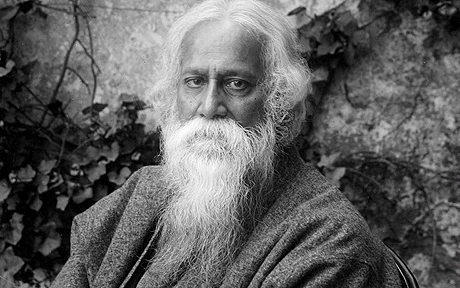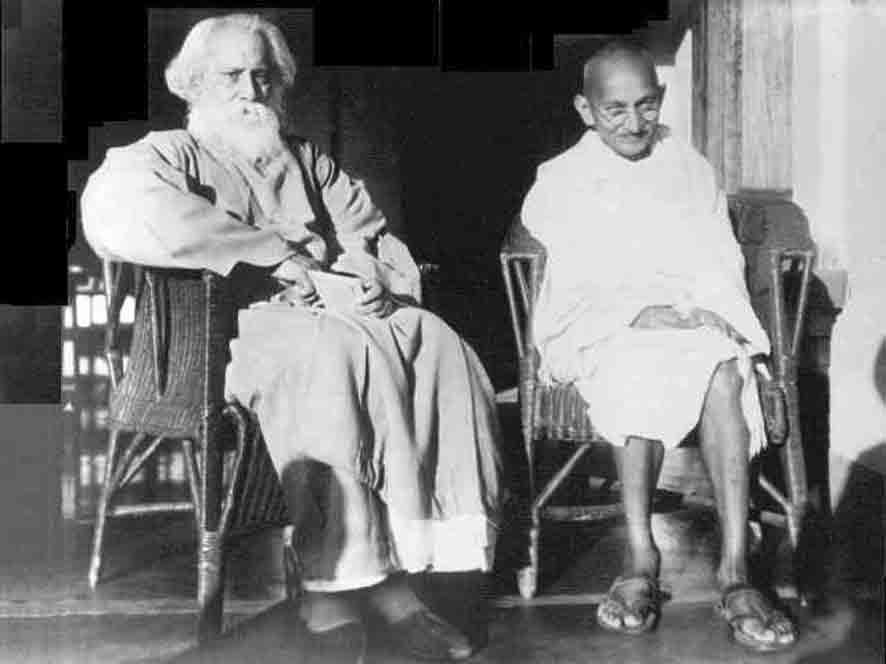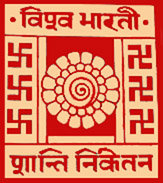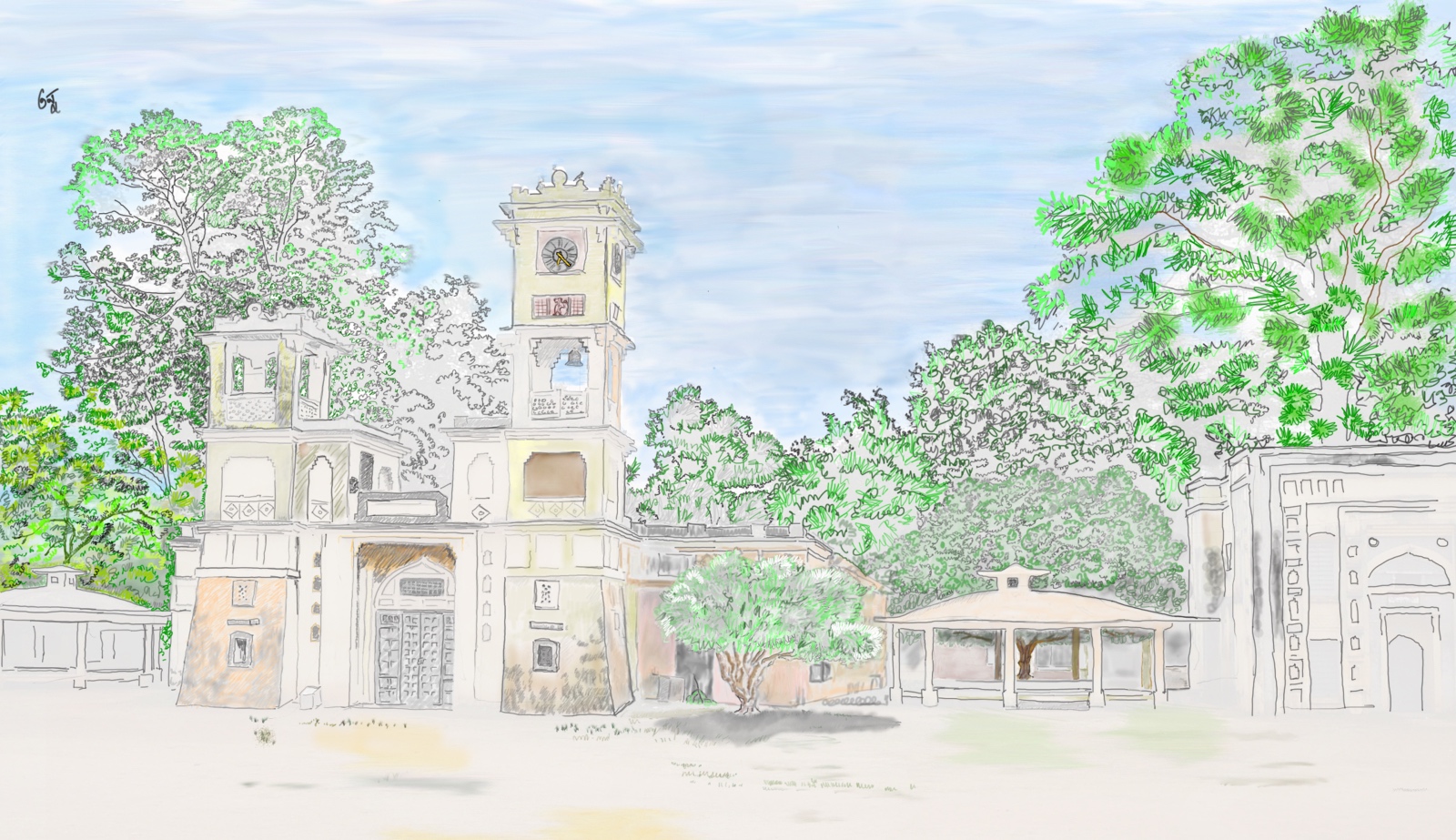There is a news that came up in a Bengali Newspaper, about possibility of the Visva Bharati University Press being eventually shut down, as per instructions from the Human Resource Department of the Government of India.
A copy of the cutting is placed here, as it was posted on the facebook page named “Santiniketan” by Snigdha Bhattacharya.
I found the news article to be a short clip of the basic news, dealing with the news superficially while tinging it with a touch of sentiment, involving shutting down of an institution that had historical and heritage links with Rabindranath Tagore going back a century.
In my view, the article does not do justice to the whole issue of the Visva Bharati University Press. I have made a cursory glance at the comments on Facebook. I find the comments wanting. Some expressed sadness or regret at the closure of one more institution that had touched many in the past. Others criticized the current Vice Chancellor, Ms Sabujkali Sen, for mishandling the matter.
I considered the issue to be a symptom that casts a shadow not only over Santiniketan and vista Bharati, but has an ever widening and overlapping malady that affects Bengal in particular, with even wider but fainter link with the rest of the world.
Being my own person, and not known to always be politically correct, I thought my own views on all this deserves to be recorded. However, Facebook was considered to be not suitable platform for writing longer and serious posts, mainly because whatever one writes disappears down the sinkhole of fast moving media snippets. So, I decided to write my opinion on my own blog. Perhaps some day this will be a short subchapter in a book of essays.
So, what is it about the press, about Visva Bharati, and about the Human Resource Department wanting to close it down ?
Well, Visva Bharati is a once touted world university conceptualized by Rabindranath Tagore. It was to be a receptacle where the great minds and ideas of the world made its nest.
The best way I can distinguish Tagore’s idea of a world university as against those that already existed in the west in his time, which Tagore was intimate with, such as Oxford, Cambridge, Harvard etc, as well as European, Russian and from the far east, is that this Visva Bharati in India was to be in a sense an eastern evolution more in the lines of Nalanda or Takshashila, on the eastern and western ends of the Indian subcontinent that are often considered to be among the oldest of Universities, going back several Millennia.
In my way of thinking, these were units that mainly parted socio-spiritual training and notion of living in harmony with nature.
Tagore had, as I interpret his own writings, found the major difference between the early eastern (now more or less dead at the time of Tagore) concept of civilization and the western counterpart, was to do with the critical aspect of human-nature interface.
In Tagore’s view, the western civilization, the Greek onward, formed fortress cities and kept nature out except for manicured gardens, and spread the idea that nature was hostile, to be treated as an enemy. It needed to be conquered, controlled, subjugated and thus used, by the civilized man.
In contrast, Tagore thought high of the earliest of eastern sages that lived in the forest. While cities were the centre of political power, the Kings travelled to the forests to pay homage to the sages and learn from them. The wisdom parted included living in harmony with nature, rather than in conflict with it.
Although his statements on the creation of the school more than a century ago, and its eventual evolution into a full fledged university a few decades down the line may not have a distinct and clearcut roadmap on the curriculum of the University, it is pretty clear in my mind, that to live in harmony with nature and to allow nature a free rein in the University and surroundings was considered part of the overall education system. Nature, and man’s place it it was to be an integral part of a students evolving world view. The university would create not just job seekers to be spokes in the western “development” model of a future “modernized” India, but also ideal world citizens that would seek to find an equitable harmony where progress for one species did not mean destruction of all else. Also, his views on nature and surrounding was compounded with his wishes to redress the imbalance between the urban and the rural population. He described this relationship as not among partners, but more like that of the master and servant, where the cities were essentially exploiting and suffocating India’s rural communities, their aspirations, their economy and their dreams.
Tagore believed India had no future if it did not learn to redress this imbalance and did not learn how to live without destroying nature.
Visva Bharati was to perform various roles to fulfil Tagore’s evolving views on man’s complicated role in society, in nature, and in the planet.
Visva Bharati Press was to play a small but significant role in it. And it did play an important role for a while, in my view.
But that was then.
What happened to the place, post Tagore, is just as important, to understand.
Visva Bharati went into a steady and relentless decline, which started from the time Tagore got too old to preside over day to day affairs of the place. This general decline, in my view, reflects the post golden age general decline of the Bengali psyche.
Visva Bharati was never designed to be an island. Its high nosed academicians never really supported the idea of establishing and nourishing any people to people contact and bridge with rural, much to Tagore’s disappointment. Visva Bharati failed to actively engaged in understanding and solving the urban-rural divide, and thereby failed to either save the urban decay, or save the rural degeneration. The institution stopped being an agent of positive change. Instead, it started to aimlessly float downstream with the rest of Bengal, like flotsam and jetsam twirling in the eddies along the numerous creeks and rivulets that spring up along the Birbhum high grounds every monsoon.
India Most of the talented folks that came in the times of Tagore were personally attracted to the views and aspirations of Tagore, one of the most multi-faceted and far sighted geniuses to have come out from modern India. Unfortunately, with his demise, the light went out of Santiniketan, the emerging University town that mushroomed up around the place. 
Unlike other Universities of the world, the collective efforts of the people of Santiniketan did not work to preserve this unique modern age Nalanda or Takshashila, and essentially ran it down into the ground, through selfishness, corruption, nepotism, aversion to do hard or difficult work, narrow minded tunnel vision and many other maladies that were typical of the babu culture of the Bengali gentry that was essentially created at the time of the British Raj, as a collaborator class that helped run the country on behalf of their western masters.
The basic problems of the University included lack of vision, and lack of sympathy for the rest of India, particularly the environmental and socio-economic decline of rural India that could be related to a planetary environmental decay visible to Tagore even in his own life.
Compounded on top of that was the abject failure of the Bengali intelligentsia in running any commercial enterprise (Banijya), thereby turning themselves into job seeking servant class for the rest of India and the world in due course. General decline of Visva Bharati mirrored the general decline of Bengal, culturally, economically, entrepreneurally, socially and environmentally. Visva Bharati had no worthwhile patronage among its exstudent body, and could not survive on its own any more. It became dependent on the Government of India, which, by and large did not fully understand the concept behind and the necessity of having Visva Bharati as an unique university. If the government did not understand it, the fault lies with the people of Santiniketan, who themselves were largely ignorant of it and therefore could not properly articulate it to anybody, let along the Government.
Bengal stopped reading Tagore, listening to Rabindrasangeet or even Bengali folk music. Instead, Hindi music and the bollywood film industry became the source of cultural nourishment for the Bengali masses. Tagore became a novelty, and Tagorians became the custodians of a fast shrinking crystal ball.
Visva Bharati press declined not only because of a declining market, but also due to inefficiency – which became the defining character of everything Visva Bharati. This inefficiency, coupled with corruption that may or may not extend up and down the ranks, became the medusa that nobody wanted to talk about. Too many folks were interested in milking the cash cow to its death rather than nourishing it for long life.
All this is the general background, that brings us to the impending closure of the University Press.
The University Press was to mesh with the overall scheme of the place. Every major University had its own press, and would print periodicals, journals, and its own research papers and books. Tagore was not supposed to be the sole contributor. In that sense, the University press was comparable to those attached to the western Universities. Besides, it fit into the overall scheme of self sufficiency and self reliance.
Yes, it was perhaps started by components and mechanical parts donated from abroad. Tagore contributed a lot of the early material to give the press a boost. Journals did come out from it, including periodicals. I remember reading them in my own childhood, in Bengali, though the topics might have appeared dry to me.
Part of the school curriculum for me was to learn to make handmade paper in Silpa Sadan area. From how to make paper, to how to run a press, were all, tiny threads that were woven into the overall fabric that provided the lining of the nest (nidam) where great ideas and human aspirations would hatch.
The design of the book cover, in those days of simple living and high thinking, was an uniform pale yellow colour with black lettering, soft cover books. It had an uniformity that might appear regimental to an outsider, but was perhaps more to do with economics of running a press on a shoestring budget, than a wish to standardize everything into a prison garb styled uniformity.
The quality of the binding, like Bengal in general and Santiniketan under focus, had deteriorated over time. Lack of vision and lack of colour in their vision kept the press shackled to the same design well past the time of budget constraint.
For many years now, the so called press was more a relic than a vibrant and active institution. It had almost no employees. The press was engaged in hardly any printing work for a long time. Their outlet store hardly had any copy of any publication available. The few employees that still drew salary were reported to be spending time swatting flies. The entire printing section and their office could be visualized as a premordial fossilized dinosaur that had been dead and gone a long time ago.
Yes, the press should have been in operation, in great health and vibrant, churning out great publications to cater to a keenly interested audience. But one thing that we apparently cannot do, that other nations can, is to preserve a good thing and keep it running, keeping a good idea and effort alive. India in general and Bengal in particular is an expert at killing everything that was good. Visva Bharati is an example. The Press is only a small part of it.
Quality of foreign participation in the University took a nosedive. Local participation gradually shrank to provincial and then narrowed down to district level, for the university support staff, while the professorship transformed itself to a coterie that definitely resisted employing either talented people or folks that could continue the tradition of Santiniketan, meaning people that studied there, and had perhaps a minimal influence of Tagore. Tagore, in short, was banished from the place, to be replace by a horde of do-nothing parasites.
Employing hard working, brilliant, or creative souls were a threat to those that were already employed. Individual brilliance casts the rest an unflattering light on the rest. Therefore, brilliant people should not be employed, as a start, and should one show signs of it, needed to be cornered, sacked, or driven out.
Instead of being uniformly above average and a beacon for the world, Visva Bharati opted to be an uniformly useless tumour to an emerging India and a symbol of decay for the rest of the world.
Today, the government of India is not what it used to be two generations ago. It funds a lot of central universities. Much as Tagore did not like over politicizing of student activities, every political party in power centrally or provincially has done its utmost to politicize every group and body of the university, from student to staff to the vice chancellor. In more ways than one, Visva Bharati has become the near exact opposite of Tagore’s dreams. For the rest of India and the world, VBU has perhaps become an example of what a good University should not be like.
 Scholars, academics and administrators that came to help run the place even in Tagore’s time and immediately after him, bought small pieces of land around the University compound, built their own homes and started a process of further decay by stealing parts of the adjacent land, gobbling up proposed land set aside for access roads, concretizing the neighbourhood and generally turned the surrounding area into perfect examples of unplanned shanty towns, in complete contrast with the original layout of the University, assisted by the likes of Patrick Geddes, the renowned Scottish geographer, biologist and one of the worlds early pioneering town planners.
Scholars, academics and administrators that came to help run the place even in Tagore’s time and immediately after him, bought small pieces of land around the University compound, built their own homes and started a process of further decay by stealing parts of the adjacent land, gobbling up proposed land set aside for access roads, concretizing the neighbourhood and generally turned the surrounding area into perfect examples of unplanned shanty towns, in complete contrast with the original layout of the University, assisted by the likes of Patrick Geddes, the renowned Scottish geographer, biologist and one of the worlds early pioneering town planners.
The general decline of the institution affected every aspect of its activity. The Press eventually morphed into a white elephant that produced substandard books that people stopped buying as the Royalty of Tagore’s books, controlled by the University, expired and anybody could print his books. Unable to compete with the outside world for the popular prints and unable to provide unique material from the current inhabitants and employees of the University, the VB University press went the way of the dodo.
The Government apparently wishes to close down all University Presses, according to the news outlet, and urges the Universities to start outsourcing their publications henceforth.
Outsourcing might have an advantage – competition helps keep the cost down and the quality high, of future University publications. Also, the design of the books can be maintained same as it had been before, should the University so want. Printing can be of high quality, and done professionally. There are advantages in outsourcing publications if one is unable to run their own printing efficiently.
However, there is always the flip side of stories when it comes to Visva Bharati, and perhaps even the Government of India.
If western Universities can keep their press running for centuries (I presume that they do, and are not themselves outsourcing their publications), then why cannot Visva Bharati? If inefficiency, corruption and lack of vision is killing the press, why can these not be corrected ? If a patient is withering away under bad medical treatment, should we hang the patient and bury him to end his misery, or change the doctor ?
Why is the Government of India deciding to outsource all University publications ? Is the Government unable to control entrenched corruption and inefficiency of their central Universities? Is Visva Bharati merely among the worst examples of a general trend of decay in Indian Universities ?
Why are the people, those that lament the impending death of their University Press, not cognizant of all sides of the issues regarding the decay of their beloved University ?
This author does not fault the current Vice Chancellor for a disease that is a century old, a cancer that is slowly but surely killing a giant dream that is so far removed from its original aspirations, that nobody even remembers how to relate to it. Bengali language itself is heading towards degenerating into a dialect. Visva Bharati has little to offer to Bengal, to India, and to the planet.
Whose fault is it ? I consider it collectively everybody’s fault, including mine. We are an exceedingly selfish species to start with. Human endeavour is singularly responsible for the impending collapse of the planetary system – but that is largely thanks to the western civilization that hastened what the rest of mankind was slowly ambling towards. As to Visva Bharati, the primary suspects are those that have been milking the place for personal benefit, from the long line of vice chancellors to the long line of lower grade academic and non-academic staff.
It is rumoured that the Government of India is not interested to fund Universities and is looking to privatize them to the highest bidders. This itself is a double edged sword, but if this is so, I can understand how the Government, often beholden to corporate power and influence, would go that way. One can hardly fault the Government though – since Visva Bharati itself has shown no sign or reviving itself from terminal stupor.
Visva Bharati has become a public funded enterprise that serves to constructive purpose for humanity. Welcome to Visva Bharati – the terminal patient. If the University Press is to go, it will perhaps have a better chance to survive in folk memory and its parts survive in a museum. In fact, the whole University might do better as dead artifacts in a museum.
 I had recently written to the Prime Minister, copied to the Vice Chancellor, about shutting the University down completely, and then to re-create it from scratch in a fresh incarnation, since the current University, in my personal view, was beyond saving.
I had recently written to the Prime Minister, copied to the Vice Chancellor, about shutting the University down completely, and then to re-create it from scratch in a fresh incarnation, since the current University, in my personal view, was beyond saving.
Perhaps the rumoured privatization will trigger a similar step. Is there going to be a parliamentary act to make that happen ?
Meanwhile, I wish the University Press Godspeed and a well earned rest in peace.
